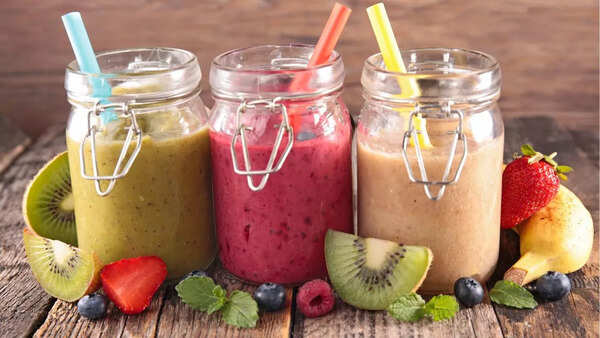Smoothies offer a convenient and nutrient-rich breakfast option, ideal for those with busy schedules. These blended beverages provide a quick and refreshing way to kickstart the day. Packed with fruits, vegetables, and other wholesome ingredients, smoothies can be customized to suit individual tastes and nutritional needs. With a vast array of possible ingredient combinations, you can easily create a smoothie that is both delicious and beneficial. Whether your goal is to increase energy levels, manage weight, or simply enjoy a healthy breakfast, smoothies present an excellent solution.
However, it's important to consider potential drawbacks associated with consuming smoothies regularly for breakfast.
A smoothie is essentially a cold, blended beverage composed of various ingredients, typically including fruits, vegetables, and a liquid base such as milk or water. These components are pureed in a blender until a smooth and creamy consistency is achieved.
Popular smoothie ingredients include:

Being mindful of ingredients and portion sizes can help mitigate these risks.

1. Green Smoothies - Typically made with leafy greens such as spinach, kale, or arugula, combined with fruits and vegetables to mask any bitterness.
2. Fruit Smoothies - Feature a variety of fruits, which can be fresh, canned, or frozen. Common choices include bananas, berries, and other preferred fruits.
3. Protein Smoothies - Designed to boost protein intake. Protein sources can be animal-based (milk, yogurt) or plant-based (protein powder). These smoothies are especially popular among fitness enthusiasts for muscle building and repair.
Newer articles
Older articles
 Daren Sammy Fined, Handed Demerit Point for Umpire Criticism After Test Match Comments
Daren Sammy Fined, Handed Demerit Point for Umpire Criticism After Test Match Comments
 Gavaskar Calls for Yadav's Inclusion, Questions Middle Order After India's Test Defeat
Gavaskar Calls for Yadav's Inclusion, Questions Middle Order After India's Test Defeat
 Decoding Your Health: Spotting 5 Prediabetes Warning Signs Before a Blood Test
Decoding Your Health: Spotting 5 Prediabetes Warning Signs Before a Blood Test
 X Corp. Cracks Down: Half a Million Indian Accounts Suspended for Policy Breaches
X Corp. Cracks Down: Half a Million Indian Accounts Suspended for Policy Breaches
 Headline:
Early Warning Signs: 5 Heart Attack Symptoms to Watch Out For Weeks in Advance
Headline:
Early Warning Signs: 5 Heart Attack Symptoms to Watch Out For Weeks in Advance
 Facial Icing: Benefits, Risks, and Safe Application of This Viral Beauty Trend
Facial Icing: Benefits, Risks, and Safe Application of This Viral Beauty Trend
 Chess Sensation Praggnanandhaa Joins Magnus Carlsen's Team Liquid for Esports World Cup
Chess Sensation Praggnanandhaa Joins Magnus Carlsen's Team Liquid for Esports World Cup
 Mastering JPG to PDF Conversion: A Graphic Designer's Guide to Quality and Efficiency
Mastering JPG to PDF Conversion: A Graphic Designer's Guide to Quality and Efficiency
 MI New York's Tajinder Dhillon Shines: From IPL Benchwarmer to MLC Star
MI New York's Tajinder Dhillon Shines: From IPL Benchwarmer to MLC Star
 Akmal Blasts PCB's Interim Coach Choice: Ex-Cricketer Questions Logic Behind Mahmood Appointment
Akmal Blasts PCB's Interim Coach Choice: Ex-Cricketer Questions Logic Behind Mahmood Appointment